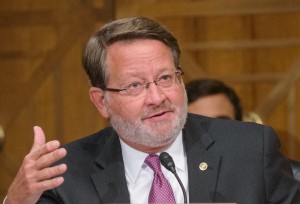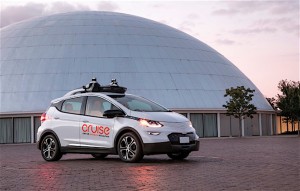
Michigan Senator Gary Peters was one of a group of legislators sponsoring the Driving America Forward Act.
Automakers have been working diligently to overcome technical obstacles keeping self-driving cars from being a reality and now they’ve gotten some news on the legislative front that should make them happy.
The House Energy and Commerce Committee and Senate Commerce Committee sent automakers, safety groups and others interested parties a request for input and said they were working on a “bipartisan and bicameral basis to develop a self-driving car bill,” according to Reuters.
The two sides have been working on legislation about autonomous vehicles for the past two years, but after the House passed a bill, but it stalled in the Senate. Democrats had concerns about several provisions of the bill, most of them focused on safety issues. The bill died in December.
(GM, Cruise Put San Fran Robo-Taxi Trial on Hold)
However, that hasn’t stopped the charge of automakers looking to press forward with self-driving vehicles, but it has given them pause. General Motors’ subsidiary, Cruise Automation, announced recently it was putting its plans for a driverless fleet of taxis in San Francisco on hold indefinitely.
The company felt it needed to take more time to research and test its vehicles and inform the public about the driverless vehicles that would be buzzing around on city streets. So the resumption of the process has been welcomed.
“Right now various countries are exploring regulations that will shape the future of autonomous vehicles, and the U.S. risks losing its leadership in this life-saving, life-changing technology, so we urge Congress to move forward now, this year,” said Gloria Bergquist, spokeswoman for the Alliance of Automobile Manufacturers, which represents GM, Volkswagen AG, Toyota Motor Corp and other automakers.
The committees’ letter sets a deadline for input of Aug. 23. The two bodies want feedback on many aspects o
f the vehicles’ operation, including federal rules, testing, privacy, disability access, cybersecurity, consumer education and crash data.
(New Study Shows Motorists Confused By High-Tech Features Like Autopilot, ProPilot and Super Cruise)
As mentioned, the House passed legislation in September 2017 by voice vote to speed the adoption of self-driving cars, Reuters noted.
Under that bill, automakers would have been able to win exemptions from safety rules that require human controls, such as steering wheels and brake and gas pedals. Additionally, states would be permitted set rules on registration, licensing, liability, insurance and safety inspections but not set performance standards, Reuters noted.
Congress isn’t the only part of the government working this issue. The National Highway Traffic Safety Administration officials last fall noted the agency was considering a pilot program to allow real-world road testing for a limited number of vehicles without human controls.
Automakers must currently meet nearly 75 auto safety standards, many of them written under the assumption that a licensed driver would be able to control the vehicle using traditional controls, Reuters reported.
(Senate Ignores Important Automotive Legislation)


Are these people for real? You know what will happen, don’t you? They will buy these cars and drive in them without any concern as to what weather conditions, traffic, or anything else outside is going on. When they get in an accident it’ll never be their fault. Technology is one thing (whatever that is) but human inaction is another. So the absurd politicians will give them license to drive these machines, but I’d bet these folks have more money than brain power.
You do realize that what Congress is calling for is legislation that makes it easier to develop and test autonomous technology BEFORE it goes on sale or into widespread commercial use?
Paul E.